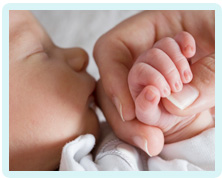
Nerve Damage During Childbirth
During childbirth the nerves in the pelvic floor can become damaged. For some women this will lead to ongoing issues with regards to incontinence and prolapse.
"Before we contacted you we had no real idea that we had grounds for a medical negligence claim but after speaking to you it became clear that Wendy was indeed treated poorly. Chris Bird took the time to explain what was happening and kept us to speed. Our deepest gratitude to you all and Chris in particular."
Mr And Mrs H
If you have suffered a birth injury and would like advice about a possible medical negligence claim, please call us on 0800 234 3300 (or from a mobile 01275 334030) or complete a Free Online Enquiry.
Nerve damage during childbirth
Pregnancy, labour and the delivery of a baby all put the pelvic floor under tremendous strain. Just the pressure of the second stage of labour, which is the 'pushing' stage, can result in permanent nerve damage.
The nerve that often suffers the most harm is the pudendal nerve. The pudendal nerve is located in the pelvis and extends down through to the perineum and buttocks. It enables function and sensation in the perineum, anus, pelvic floor and vagina.
During labour and the delivery of a baby's head, the pudendal nerve can be both compressed and stretched. This typically happens as the baby's head descends down into the mid-pelvis.
Anyone giving birth by way of vaginal delivery can experience pudendal nerve damage. The risks are increased if there is:
- A long second stage of labour
- An assisted delivery
- A larger than average baby
- A third degree tear
Consequences of nerve damage during childbirth
Some women will not suffer any ongoing problems after childbirth, even if there has been nerve damage.
However, others who sustain pudendal nerve damage can develop life-changing complications, including urinary incontinence, faecal incontinence and pelvic organ prolapse. This can happen even if the birth has been seemingly uneventful.
There is evidence to suggest that the effects of pudendal nerve damage become more pronounced with time. Therefore a woman may have relatively few symptoms in the aftermath of childbirth, only to find that incontinence and other issues arise later on. Symptoms often become worse after the menopause, when the muscles lose elasticity.
Is nerve damage during childbirth negligent?
Nerve damage is an accepted risk of childbirth and cannot normally be blamed on medical practitioners. There may be a case, however, if the birth was mismanaged. For example, if a patient was left to labour for far too long, causing significant neurological harm.
Medical negligence claims relating to maternal birth injuries are a common source of litigation. Nevertheless, claims usually arise because a severe tear has not been diagnosed and treated.
Talk to a solicitor
If you want to know whether your injuries have occurred as a result of medical negligence, please get in touch with our legal team today. We will listen to the details of your care before suggesting whether you have been the victim of negligent medical practice.
Can We Help You With A Birth Injury Enquiry?
We offer No Win No Fee funding for medical negligence claims which we will discuss with you during your free initial telephone discussion.
Would You Like Assistance from Specialist Birth Injury Claims Solicitors?
If you would like to benefit from a service of excellence with total commitment to client care from a small and friendly team, Glynns are ready and waiting to help you.
Please call us on 0800 234 3300 (or from a mobile 01275 334030) or complete a Free Online Enquiry.



